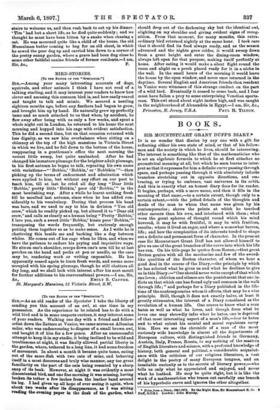BIRD-STORIES.
[TO THZ EDITOR 07 TKR " SPECTATOR:"]
Sin,—Among your many interesting accounts of dogs, squirrels, and other animals I think I have not read of a talking starling, and it may interest your readers to know how clever and amusing this common bird is, and bow easily reared and taught to talk and mimic. We secured a nestling eighteen months ago, before any feathers had begun to grow, and brought him up by hand. He naturally grew up perfectly tame and so much attached to us that when, by accident, he flew away after being with us only a few weeks, and spent a whole night out in London, he returned to his home the next morning and hopped into his cage with evident satisfaction. This he did a second time, but on that occasion returned with less dignity, as we saw him overbalance when sitting on a chimney at the top of the high mansions in Victoria Street in which we live, and he fell down to the bottom of the house, reappearing in a gentleman's office the next morning the veriest little sweep, but quite unabashed. After he had changed his immature plumage for the brighter adult plumage, in his first autumn he began to talk, repeating his own name with variations—" Bobbie,' Bobkin,' or Bobbikin "'—then picking up the terms of endearment and admiration which were applied to him, but without any effort on our part to teach him, till at last he cried all day long "Dear little 'Bobbie,' pretty little Bobkin,' poor old Bobbie,' " in the most bewitching way. After a while he learnt nothing fresh till he moulted last autumn, since when he has added con- siderably to his vocabulary. During that process his head was bare, and we used to say to him in derision " You old crow," which he readily picked up, but altered it to " Dear old crow," and calls as clearly as a human being " Pretty Bobbie,' I love you, such a sweet little Bobbie,' kissie poor Bobkin,' " transposing the words frequently, but curiously enough putting them together so as to make sense. As I write he is chattering this beside me and barking like a dog between whiles. He comes out of his cage when he likes, and when we have the patience to endure his prying and inquisitive ways. He sits on one's shoulder, creeps down one's arm till he at last perches on the hand and pecks at pen or needle, as the case may be, rendering work or writing impossible. He has apparently ceased again to learn fresh words, and seems more occupied with his spring plumage, though he still chatters all day long, and we shall look with interest after his next moult for further additions to his conversational powers.—I am, Sir, EMILY S. CAPPER.
St. Margaret's Mansions, 51 Victoria Street, S.W.
[To TH. EDITOR 07 THZ SPICTATOR:1 Six.,—As an old reader of the Spectator I take the liberty of sending you this account of an owl, at one time in my possession. As the experience to be related has to do with a wild bird and is in some respects curious, it may interest some of your readers. Walking one day with a friend and fellow- artist down the Zattore at Venice, we came across an Albanian sailor, who was endeavouring to dispose of a small brown owl, and bought it of him for a few pence. After an unsuccessful attempt to keep it in my studio, it being inclined to be wild and troublesome at night, it was finally allowed partial liberty in the garden, where, tethered to a long line, it had some freedom of movement. In about a month it became quite tame, eating out of the same dish with two cats of mine, and behaving itself in a most decorous and truly wise manner, any too great familiarity on the part of the cats being resented by a sharp snap of its beak. However, at night it was evidently a most discontented bird, and one fine morning it was missing, having broken its tether a few inches from the leather band around its leg. I had given np all hope of ever seeing it again, when about two weeks after its disappearance, as I was sitting reading the evening paper in the dusk of the garden, what
should drop out of the darkening sky but the identical owl, alighting on my shoulder and giving evident signs of recog- nition. From that moment, for many months, this extra- ordinary bird returned nightly at the same hour. I took care that it should find its food always ready, and as the season advanced and the nights grew colder, it would swoop down from a great height and enter the dining-room window, always left open for that purpose, making itself perfectly at home. After eating it would make a silent flight round the room and alight on a perch placed ready for it in a niche in the wall. In the small hours of the morning it would leave the house by the open window, and never once returned in the daytime. Several English and American friends then resident in Venice were witnesses of this strange conduct on the part of a wild bird. Eventually it ceased to come back, and I fear must have fallen a prey to some enterprising Venetian sports- man. This owl stood about eight inches high, and was caught in the neighbourhood of Alexandria in Egypt.—I am, Sir, &c.,
Princeton, N. Jersey, U.S.A. PAUL H. TILTON.






































 Previous page
Previous page